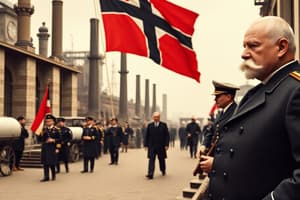Podcast
Questions and Answers
What was the outcome of the Austro-Prussian War in 1866?
What was the outcome of the Austro-Prussian War in 1866?
- The German Confederation was formed.
- The North German Confederation was formed. (correct)
- Austria gained control of Schleswig and Holstein.
- Prussia was defeated and lost its independence.
What was the main goal of the Frankfurt Parliament in 1848-1849?
What was the main goal of the Frankfurt Parliament in 1848-1849?
- To promote German unity and strength through a loose association of states.
- To establish a unified German state through a series of wars.
- To create a constitutional monarchy. (correct)
- To dissolve the German Confederation.
Who was declared the German Emperor in 1871?
Who was declared the German Emperor in 1871?
- King Wilhelm I of Prussia (correct)
- Otto von Bismarck
- The President of the Frankfurt Parliament
- The King of Austria
What was the result of the Franco-Prussian War?
What was the result of the Franco-Prussian War?
What was the strategy of Otto von Bismarck to unify Germany?
What was the strategy of Otto von Bismarck to unify Germany?
What was the consequence of the Danish War in 1864?
What was the consequence of the Danish War in 1864?
What was the role of Otto von Bismarck after the formation of the German Empire?
What was the role of Otto von Bismarck after the formation of the German Empire?
What was the significance of the year 1815 in the formation of the German Empire?
What was the significance of the year 1815 in the formation of the German Empire?
What was the main outcome of the revolution in 1848?
What was the main outcome of the revolution in 1848?
Where was the German Empire proclaimed in 1871?
Where was the German Empire proclaimed in 1871?
Flashcards
Austro-Prussian War Outcome (1866)
Austro-Prussian War Outcome (1866)
The North German Confederation was formed.
Frankfurt Parliament Goal (1848-1849)
Frankfurt Parliament Goal (1848-1849)
To create a constitutional monarchy.
German Emperor (1871)
German Emperor (1871)
King Wilhelm I of Prussia.
Result of Franco-Prussian War
Result of Franco-Prussian War
Signup and view all the flashcards
Otto von Bismarck's Strategy
Otto von Bismarck's Strategy
Signup and view all the flashcards
Consequence of the Danish War (1864)
Consequence of the Danish War (1864)
Signup and view all the flashcards
Otto von Bismarck's Role
Otto von Bismarck's Role
Signup and view all the flashcards
Significance of 1815
Significance of 1815
Signup and view all the flashcards
Main Outcome of 1848 Revolution
Main Outcome of 1848 Revolution
Signup and view all the flashcards
Where Empire Proclaimed (1871)
Where Empire Proclaimed (1871)
Signup and view all the flashcards
Study Notes
Formation of the German Empire
Background
- The German Confederation, established in 1815, was a loose association of 39 German states.
- The Confederation was ineffective in promoting German unity and strength.
The Frankfurt Parliament (1848-1849)
- A revolution in 1848 led to the formation of the Frankfurt Parliament, which aimed to create a unified German state.
- The parliament was dominated by liberals who wanted a constitutional monarchy.
- The parliament's proposals for a unified Germany were rejected by the Austrian and Prussian governments.
The Prussian-led Unification
- Prussia, under the leadership of Otto von Bismarck, took the lead in unifying Germany.
- Bismarck's strategy was to create a unified Germany through a series of wars and alliances.
The Wars of Unification
- The Danish War (1864): Prussia and Austria defeated Denmark, gaining control of the territories of Schleswig and Holstein.
- The Austro-Prussian War (1866): Prussia defeated Austria, leading to the dissolution of the German Confederation and the formation of the North German Confederation.
- The Franco-Prussian War (1870-1871): Prussia defeated France, leading to the formation of the German Empire.
The Proclamation of the German Empire (1871)
- On January 18, 1871, the German Empire was proclaimed at the Palace of Versailles.
- King Wilhelm I of Prussia was declared the German Emperor.
- Bismarck became the Chancellor of the German Empire.
Key Features of the German Empire
- The empire was a federal state with a constitutional monarchy.
- The emperor held significant powers, but was also limited by the constitution.
- The Bundesrat (Federal Council) represented the interests of the individual states.
- The Reichstag (Imperial Diet) was the legislative body of the empire, elected by universal male suffrage.
Studying That Suits You
Use AI to generate personalized quizzes and flashcards to suit your learning preferences.




